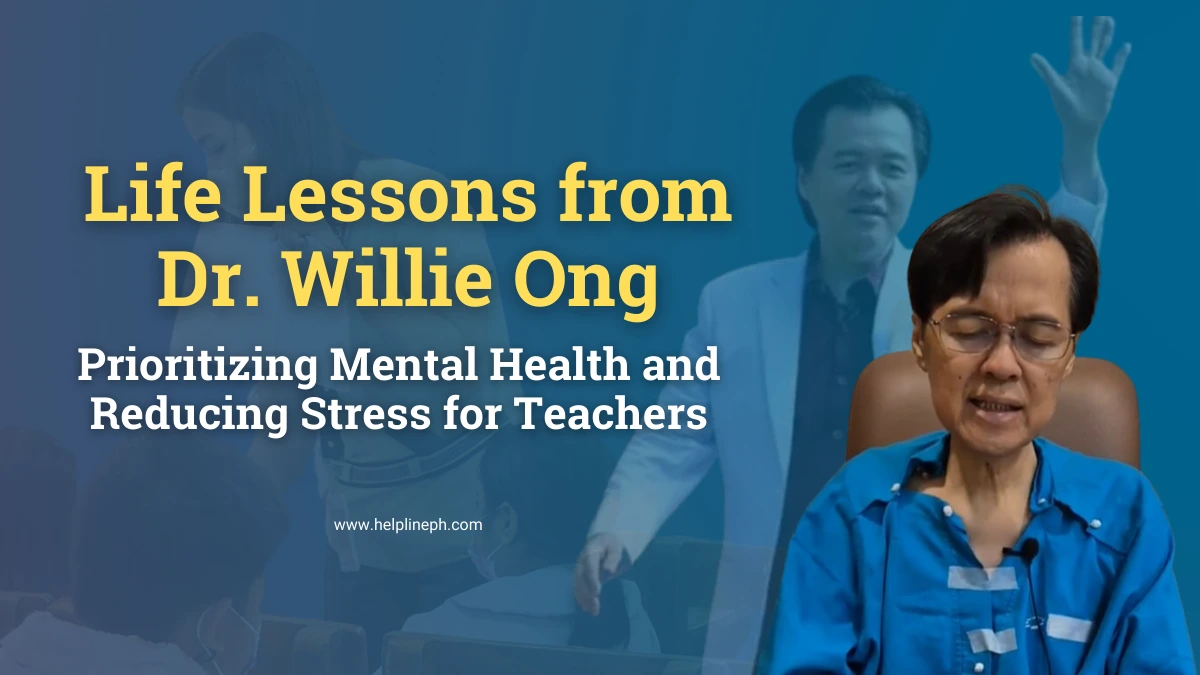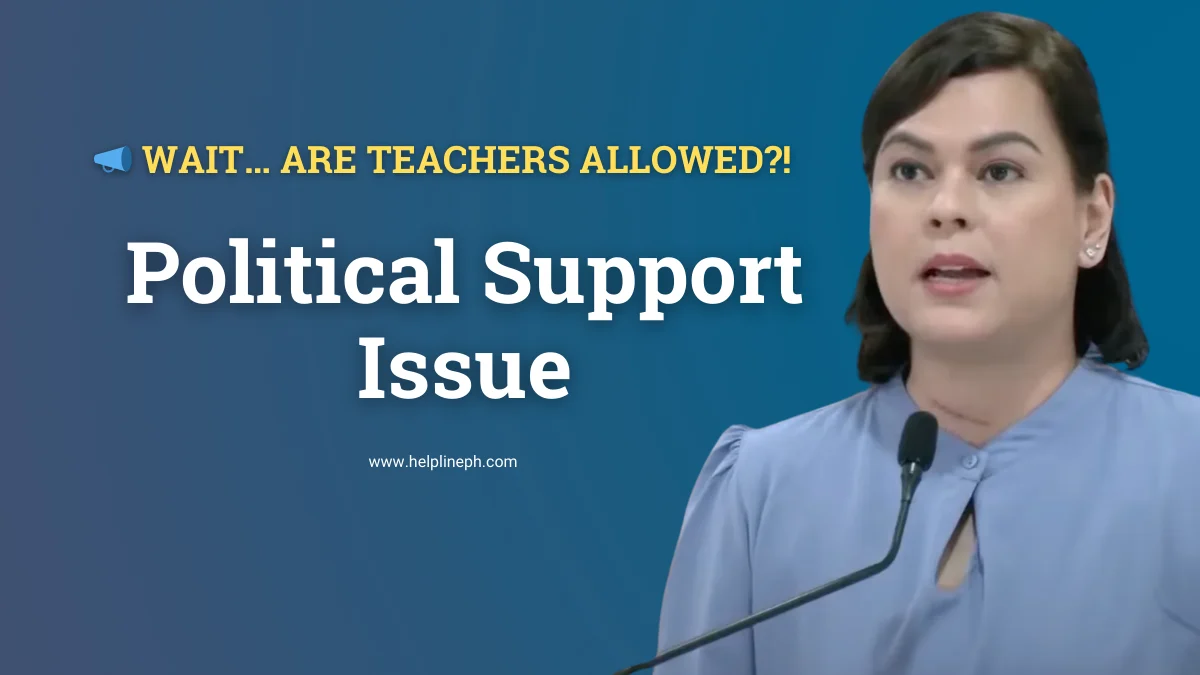Stress is one of the biggest health threats we face today, and it affects everyone, no matter their profession. Dr. Willie Ong, a well-known Filipino doctor, often talks about how important it is to manage stress and take care of your mental health. While his advice applies to everyone, this article focuses on teachers—a group that deals with high levels of stress every day.
Teaching is one of the most important and noble professions. Teachers shape young minds, inspire future generations, and make lasting impacts on their students. But teaching is also a demanding job with constant expectations from various sources: the government, the Department of Education (DepEd), regional offices, school division offices, districts, and principals. These pressures, combined with the responsibilities inside and outside the classroom, can lead to severe stress, which affects both mental and physical health.
Stress: A Silent Killer for Teachers
Dr. Willie Ong often talks about stress being a “silent killer.” Stress doesn’t just affect your mood—it impacts your entire body. Over time, chronic stress can lead to serious health problems like heart disease, high blood pressure, diabetes, and mental health issues such as depression and anxiety. Teachers, who frequently put their students’ needs first, may not realize how much their own health is suffering.
In their daily work, teachers juggle lesson planning, classroom management, student assessments, and administrative tasks. They also face pressure from parents, school administrators, and government expectations. This combination of responsibilities can create overwhelming stress, often leading to burnout. Dr. Ong’s message to teachers is clear: if you don’t prioritize your mental health, the long-term effects of stress will catch up with you.
Why Teachers Must Learn to Destress
Teaching is rewarding, but it’s also emotionally and mentally draining. If teachers don’t take time to destress and recharge, the constant pressure can lead to burnout. Burnout doesn’t just affect a teacher’s job performance—it can severely damage their physical and mental health. Dr. Willie Ong stresses the importance of taking regular breaks and making time for relaxation. This is especially critical for teachers, whose work often follows them home.
For teachers, learning how to destress is key to maintaining their well-being. Whether through exercise, hobbies, or simply spending time with loved ones, finding ways to unwind is essential. Dr. Ong reminds teachers that their health matters just as much as their work. You can’t give your best if you don’t take care of yourself.
Don’t Let Others’ Opinions Weigh You Down
Another powerful lesson from Dr. Willie Ong is to stop worrying about what others think. This message is particularly relevant for teachers, who often face criticism from all sides. Students, parents, colleagues, and administrators all have their own opinions about how teachers should do their jobs. But as Dr. Ong wisely points out, their opinions do not define you.
For many teachers, the pressure of others’ expectations can lead to stress and frustration. However, it’s important to remember that you cannot please everyone. Your health and well-being are more important than trying to meet everyone’s expectations. Let others say what they want, but always prioritize what’s best for you.
Teaching is Noble, But Your Health Comes First
Teaching is undeniably one of the most impactful and important jobs in society. Teachers dedicate their lives to educating future generations, often working long hours without much recognition. However, Dr. Willie Ong reminds us that no matter how noble your profession is, your health must come first.
Stress can have long-lasting effects on both the body and the mind. Prolonged exposure to stress can lead to physical problems like heart disease and mental health issues like anxiety and depression. Teachers must recognize when they are feeling overwhelmed and take action to manage their stress. As Dr. Ong often says, “You can’t pour from an empty cup.” Taking care of your own health is the best way to continue giving your best to your students.
Practical Tips for Managing Stress as a Teacher
Dr. Willie Ong offers practical tips for managing stress, many of which are especially helpful for teachers. Here are some ways teachers can incorporate his advice into their daily lives:
- Take Breaks: Even a five-minute break can make a difference when you’re feeling overwhelmed. Step away from your work, breathe deeply, stretch, or take a quick walk to clear your mind.
- Set Boundaries: It’s okay to say no. You don’t have to take on every extra task or responsibility. Setting boundaries helps you protect your mental and physical well-being.
- Exercise Regularly: Physical activity is one of the best ways to reduce stress. Whether it’s walking, running, yoga, or any other form of exercise, make it a regular part of your routine.
- Stay Organized: Managing your time effectively reduces the stress of feeling overwhelmed. Prioritize your tasks and set realistic deadlines to stay on top of your work.
- Talk to Someone: Don’t keep your stress and frustrations bottled up. Talk to a trusted friend, family member, or colleague. Sharing your feelings can help relieve stress.
- Seek Help When Needed: If stress becomes unmanageable, don’t hesitate to seek professional help. There’s no shame in asking for support, whether from a counselor, therapist, or trusted advisor.
To the Haters, Parents Who Don’t Understand Teachers, and Teacher Bashers: This Post is For You
Teachers face immense pressure from many directions, but one of the most hurtful challenges comes from those who criticize and bash teachers without understanding their struggles. This is a message for the haters, parents who don’t understand, and those who attack teachers:
Have you ever thought about the damage you do?
It’s easy to type hurtful words behind a screen, throw negativity, and bash teachers as if it’s all just a joke. But have you ever stopped to think about the real consequences? Your words—those seemingly harmless comments—can feel like daggers to someone’s heart. And while you might think you’re “just expressing an opinion,” for the person on the receiving end, it builds up like poison.
Let’s take a moment to reflect on what happened to Dr. Willie Ong. He is a respected doctor who has spent years helping others, yet he became a target of relentless negativity, false accusations, and constant bashing. The weight of this online bullying and stress affected his health so severely that he was recently diagnosed with a rare form of cancer. He himself has said that the stress from being constantly attacked by his bashers contributed to his illness. Yes, stress from negative emotions can make you sick.
Social media should be a space for positivity, support, and connection. Unfortunately, there are those who wake up every day with the sole purpose of bringing others down. What are you gaining from it? A few moments of satisfaction? Meanwhile, the person you’re targeting may be dealing with anxiety, stress, and even serious physical illnesses—sometimes with irreversible consequences.
Ask yourself: Is your comment worth someone’s health? Can you live with the thought that your words might be contributing to a person’s suffering, or worse, to a life-altering diagnosis?
It’s time to stop the cycle. Reflect on your actions and choose to use your voice to uplift others, not tear them down. Remember that karma is real, and no one is immune to its reach. Spread love, not hate.
Mental Health Matters: A Final Thought for Teachers
Your mental health matters. As Dr. Willie Ong often reminds us, stress can destroy both your body and mind if left unchecked. Teachers have one of the most demanding jobs in the world, and the pressures they face can sometimes be overwhelming. However, by managing stress and prioritizing your mental health, you can protect yourself from burnout and continue to be the inspiring teacher your students need.
Don’t let others’ expectations or criticism weigh you down. You are doing an incredible job, and your health—both mental and physical—deserves attention and care. Let Dr. Ong’s lessons guide you to a healthier, happier life where you can give your best without sacrificing your well-being.
Frequently Asked Questions
How does stress affect teachers?
Stress can lead to burnout, health problems, and mental health challenges like anxiety and depression. It can cause both physical and emotional exhaustion, making it harder for teachers to perform their jobs effectively.
What are practical ways for teachers to manage stress?
Teachers can manage stress by taking regular breaks, setting boundaries, exercising, practicing mindfulness, and talking about their struggles with trusted friends or professionals. Staying organized can also help reduce feelings of being overwhelmed.
Why is mental health important for teachers?
Mental health is crucial for teachers because it affects their ability to teach effectively. When a teacher is mentally healthy, they are more patient, creative, and able to handle the challenges of the classroom.
How can teachers balance work and personal life?
Teachers can balance work and personal life by setting boundaries, practicing self-care, and making time for hobbies, relaxation, and loved ones. Prioritizing personal time helps prevent burnout and maintain a healthy work-life balance.
What does Dr. Willie Ong suggest for teachers struggling with stress?
Dr. Willie Ong advises teachers to prioritize their mental health, take time to destress, and not worry about others’ opinions. He emphasizes that taking care of yourself is essential for long-term health and happiness.






